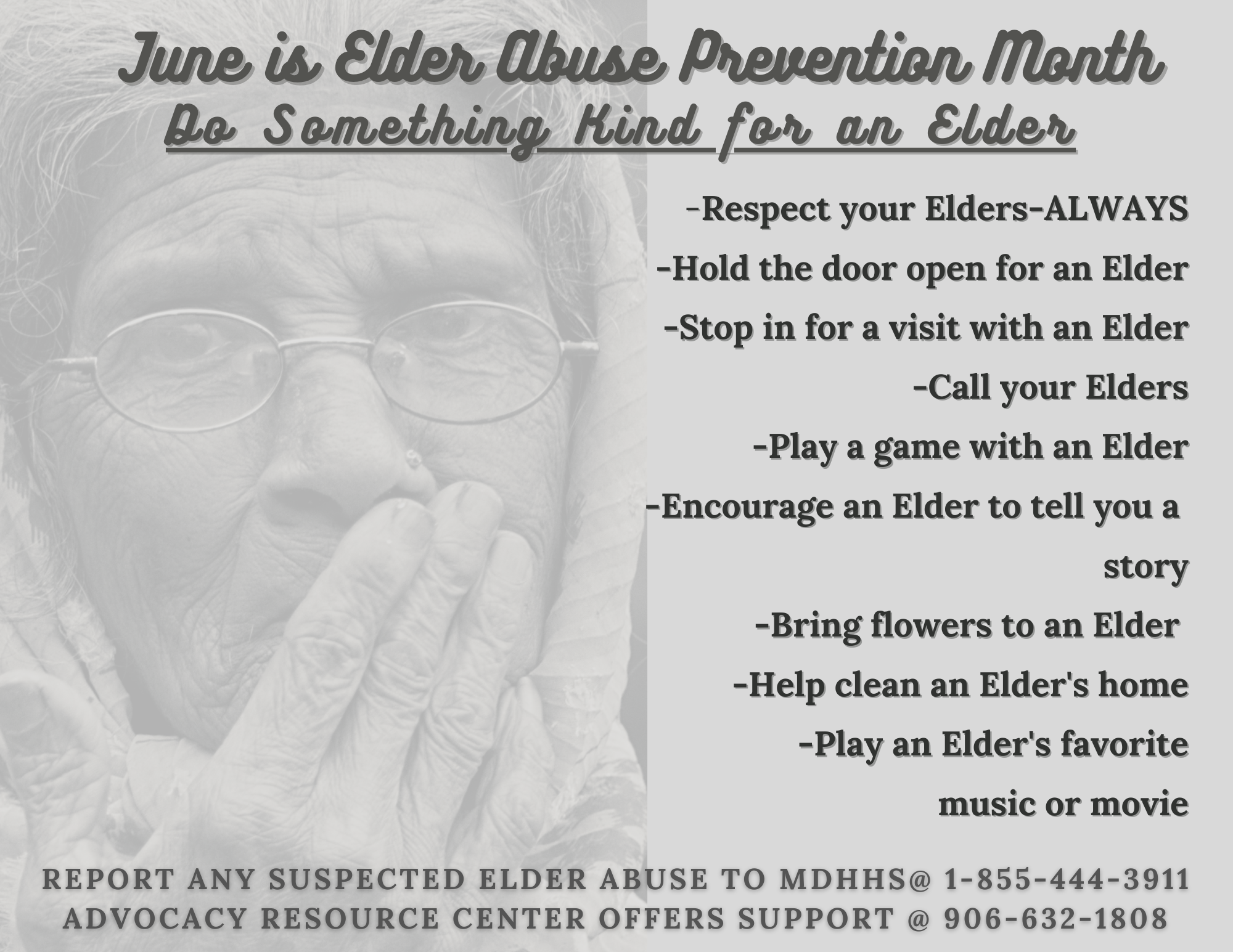June is for Elder Abuse Awareness and Prevention
Our Elders are one of our most precious resources. Elders are the connection to our past and hold stories and facts of our family’s history. Elders should always be treated with kindness and the utmost respect. Sadly, this is not the case for many of our loved ones.
An Elder is legally defined as a person 65 and older. However, in Native American communities, becoming an elder is not typically reaching a specific age but a distinct cultural status earned from wisdom, knowledge, and responsibility to others. Being an Elder is different from being elderly. “Elderly” is associated with age and the ability to care for oneself. Elder and elderly status varies from tribe to tribe. Out of respect, the term Elder will be used here.
The World Health Organization defines elder abuse as “a single or repeated act, or lack of appropriate action, occurring within any relationship with an expectation of trust, which causes harm or distress to an older person.
This type of violence constitutes a violation of human rights and includes physical, sexual, psychological, and emotional abuse; financial and material abuse; abandonment; neglect; and serious loss of dignity and respect”. (https://www.who.int/news-room/fact-sheets/detail/abuse-of-older-people)
Some of the significant warning signs of Elder Abuse may include, but are not limited to:

There are many forms of abuse against older people.
They include:
Physical: Hitting, shoving, restraining, or confining; anything causing physical pain or impairment
Emotional: Intimidation, humiliation, routine blaming, ignoring, isolating, causing anguish or distress, degrading, ridiculing, insults, using silence or profanity
Sexual Abuse: Sexual harassment, sexual activity without consent (rape), forcing elders to watch sexual acts or to undress
Financial Abuse: Stealing money, property titles, or possessions; taking over accounts or bills; spending without permission; abusing the power of attorney privilege; scamming/lying
Financial Neglect: Allowing essential bills such as mortgages, utilities, insurance, medical bills, or property taxes to go unpaid, resulting in shut-off notices, eviction, foreclosure, or not having insurance coverage
Financial Exploitation- Misusing or exploiting property, belongings, or assets. For example: using an Elder’s money, credit cards, or property without consent, under false pretenses, or through intimidation and manipulation
Health Care Fraud- Healthcare professionals overcharging or billing twice for services, falsifying claims, or charging for services not rendered
Elder Internet, Mail, and Phone Scams- Elders are often victims of significant financial loss due to scams disguised as charity donations, investment opportunities, lottery winnings, sweepstakes, or making wire transfers to thieves imitating a family member
Spiritual/Moral Abuse: Denies access to religious services or leaders, makes fun of victim’s values or religion, ignores or ridicules cultural or religious traditions, intimidates and threatens for practicing beliefs
Neglect: Failure to fulfill duties or obligations for elders, not caring for hygiene or condition of the home, poor nutrition, bed sores, soiled undergarments, medical neglect-missed appointments, not reporting medical issues
Self-Neglect: Refusal by elder to care for themselves; inadequate nutrition, improper clothing, lack of or unkempt shelter, poor hygiene, not taking medication, and not following safety precautions
Click here to read more about Elder targeted scams:
10 Common Scams That Target Seniors and How to Avoid Them (usnews.com)
Reporting Medicare fraud & abuse | Medicare
Elder abuse often goes unreported. Elders may feel shame or fear reporting their abuser for fear of retaliation, resulting in further abuse. In many instances, Elders cannot advocate for themselves.
Speak to the Elder when you are alone; let them know that you think something is wrong. Be their voice. Offer to speak for them or take them to get help if possible. If you suspect someone is abusing an Elder, report it.
If the Elder is residing in a residential or assisted living home or being cared for by an in-home caretaker, report it to the supervisor or report it directly to Adult Protective Services at 855-444-3911. You do not need to prove the abuse is occurring to report it.
Abuse may be from another resident and not the caretaker, so be sure to report it to someone in charge.
Let us CELEBRATE and HONOR our Elders. After all, we would not be here without them.
